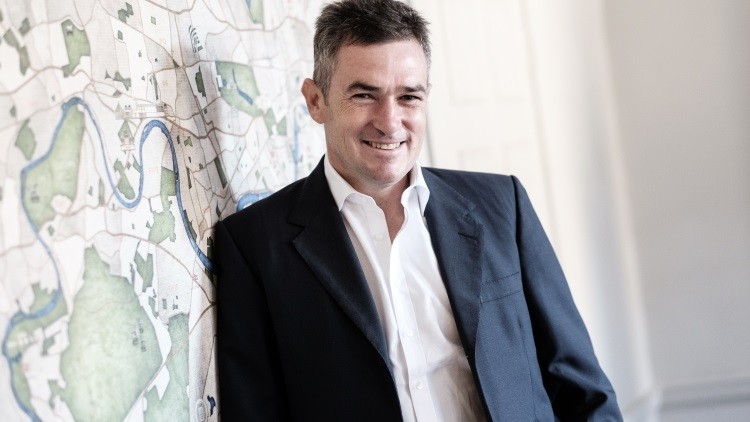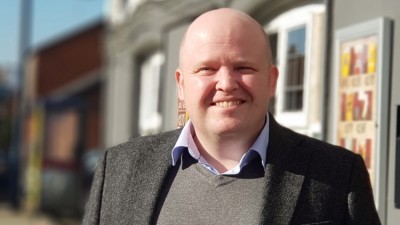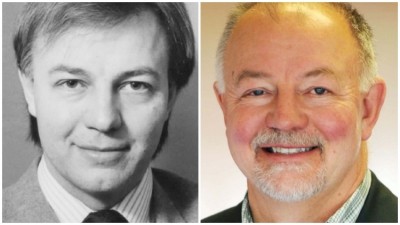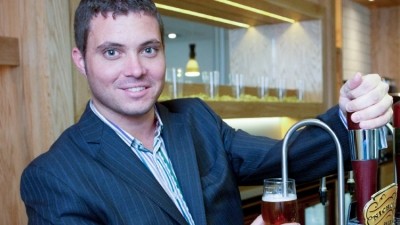Big interview: Simon Emeny Fuller’s chief executive

Arriving at Fuller’s Griffin Brewery in west London, where brewing at the site dates back to the 16th century, the last thing you’d expect to hear about in conjunction with the future of the company is Love Island and the rise of the gym bunny.
But chief executive Simon Emeny is keen to discuss both. Pointing out that such societal and behavioural changes have the potential to disrupt and change the pub and brewing industry, he says it is something that “fascinates” him.
It’s a strong point from the thoughtful and often guarded chief of London’s oldest existing brewery.
“More consumers are working long hours, taking their health seriously, wanting to go to the gym, wanting to watch Netflix or Love Island, probably drinking less alcohol and not able to save enough to pay for a deposit on a house. Pubs have to make their experience really stand for something because it’s a competitive market.” His focus on what makes people happy is not such a surprise given he started honing his skills in this area at university.
Making people happy
Emeny attended Southampton University to study economics with the intention of becoming an accountant.
Potted CV
1984-1987 BA economics at Southampton University
1994-1996 Joined Bass on the graduate training scheme and held various roles including area manager and head of strategic planning at what is now M&B.
1996 joined Fuller’s, a family business, which is listed on the stock exchange, as head of operations on its managed pubs business. He became a member of the board in 1998 and was promoted to managing director of Fuller’s Inns in 2006.
In 2010 he attended Harvard Business School and in the same year was promoted to group managing director before becoming chief executive in 2013.
In 2017, Emeny became chairman of the British Beer & Pub Association, he is also a non-executive director of The National Gallery. He is married to Selina, has four children and lives in Kew. He enjoys running, playing competitive sport and supports Tottenham Hotspur.
“At university I got involved in running uni bars and events and I really enjoyed it. I enjoyed the organisational side of things, making people happy, giving people a really good experience. I was faced with a choice of various different career options and I worked out quite soon that I didn’t want to be an accountant.”
It was this experience that shaped his decision to join the Bass graduate training scheme where, for two years, he got the chance to get lots of experience in a variety of disciplines.
“One of the things Bass did brilliantly was focus heavily on training and development. I did an MBA-style programme with them at Cranfield Business School.”
He became an area manager at 25. “It was on the managed side of the business in Kilburn all the way down to Shepherd’s Bush, Hammersmith and Fulham.
“I learned a lot about how to deal with people because a number of people that worked for me were amazing characters and considerably older than I was. I learned that, in terms of your leadership style, you have to be flexible and adaptable in how you handle people.”
Another formative role at Bass came when Emeny headed strategic planning at what is now Mitchells & Butlers. “Intellectually, I found it really challenging. It pushed me in a different direction. I learned about strategy, forward thinking and planning. It was good to be slightly out of my depth for a bit.”
While Bass offered opportunities with its grand scale – it had about 6,000 pubs while Emeny was there – he says: “If I had a criticism it would be that Bass was so massive and institutional that I didn’t feel I would necessarily get a chance to be an integral part of something.” So in 1996, Emeny applied to a company where he felt there was the potential to influence its future. Step forward Fuller’s.
Interviewed in the office that is now his own by Michael Turner – then managing director, later CEO and chair and now non-executive chair – while Euro ’96 was on, Emeny was just about to get married and go on honeymoon for three weeks. “I found Michael very impressive and very forward-thinking. He was somebody that I thought ‘I really want to work for you’,” says Emeny. “I felt that I could be an integral part of something.”
Offered role at Fuller’s
Back from honeymoon, he was offered the role of head of operations on the company’s managed pubs business.
My favourite pub
The Half Moon, Herne Hill, south London
I’d love to live near the Half Moon in Herne Hill. Without being too corporate, I think it encapsulates everything we seek to achieve as a business. It’s got an outstanding range of interesting beers from London, including our own, it’s got stunning bedrooms – I’ve stayed the night there a number of times. The pub is in a great and exciting area, the food is excellent and outside space superb. The building is a stunning Grade II-listed and restored property and I absolutely love it. Historically, I’m a London Pride drinker. If I walked in there tonight as a customer, I’d spend at least two minutes trying to work out what drink I wanted, flirting with a number of options, then I’d come back to London Pride.
He admits there were downsides, it was a much smaller company and he recognised that not being a family member could potentially hinder him. But the positives were so big he felt this was an opportunity worth taking.
Growing the managed part of the business was something he enjoyed. This may have helped mark him out as a potential future CEO early on.
About eight or nine years ago, Emeny and the board started discussing longer-term succession planning. He was canvassed to see if he was interested in potentially becoming CEO. As part of this process, he was sent to study at Harvard. He spent three months in the US with 160 other senior business people and recalls it as “a wonderful, fresh experience” after 13 or 14 years with the company. “It gave me extra confidence and the incentive to be a bit braver.”
He also credits it with helping him stay fresh. “If you’re going to invest a long period of time in one company, which is what I’ve done, it’s very important that you keep yourself fresh.”
Back from Harvard, Emeny took over as chief executive in 2013. But he says: “I wanted to ensure I had a sensible hand-over with Michael (Turner) and, to this day, we have maintained a really close working relationship. Clearly that has changed over the eight years, but I speak to him most days. He is a wise counsel.”
Asked about the company’s successes during his time there, Emeny is quick to stress they are team achievements, although he proudly says that it is no small success for Fuller’s to have “stayed at the forefront of brewing and running pubs during the whole of Michael’s time and my time. If I was taking you round our pubs today, you’d see that we are still setting the standard out there”.
Landmark things include making sure that the pub estate food is fresh and sourced almost entirely from British farms. He says he can’t think of any other company that could do that with more than 200 managed pubs. He also highlights the business’s expansion into offering bedrooms and its Shakespeare in the Garden touring pub gardens theatre.
The company can also lay claim to revolutionising the station pub with its flagship King’s Cross site, the Parcel Yard, set up to great effect in an old post office building within the station. Following the success of this pub, three other station sites are getting similar treatment at Paddington, Euston and Liverpool Street.
He says: “Another achievement would be changing the perception of the company from one where word association would be ‘Fuller’s, lovely beer’ to one where it would be ‘Fuller’s, really good pubs, warm hospitality, lovely service’, ‘I always get served quickly’.
“We get a lot of feedback from our customers as to what it is they like about our pubs. The quality of service is the thing that gets flagged up first and foremost.”
Emeny is also proud that the brewery, housed in historic buildings, has state-of-the-art equipment and highlights the launch of Frontier, the brewer’s first craft lager.
Current affairs
His frustration with the ongoing lack of clarity and limited progress over Brexit is clear. “I’m not sure what they can say has been achieved over the past two years,” he says. When the referendum result was announced he says the employer made an immediate move to “put an arm around our EU colleagues and reassure them that they are part of the family”. Fuller’s offered its 4,000 EU colleagues funding for applications for permanent residency. The take-up rate is about 20% of eligible employees and Emeny expects there will be more.
It’s no surprise that future staffing is at the front of his mind. The company has taken on 100 chef apprentices as a business “because we recognise we’re going to have a longer-term gap to fill”. This summer, the company identified it needs to find 4,000 new people in the next 18 months to fulfil growth plans. “Regrettably, we can’t source as many from the EU as we’d like to. The hospitality industry needs to be seen by Government and by families as an outstanding career option and that’s not been the case historically.”
On reports that the Government is considering scrapping the freeze on alcohol duty, he says the freeze should not only be maintained but the duty rates we pay should be aligned to the rest of Europe. “We source British ingredients, employ British workers. Surely, at this moment in time, ours is just the sort of industry that Government should be helping, not hindering.”
Emeny’s stance on “outdated” business rates is also well documented. He says he is not going to tell the Government how to reform business rates but is adamant that penalising pubcos for investing in their estates and creating new jobs by ratcheting up business rates is counterproductive. “Of course, the Government has a perfect excuse to not tackle it because they’re fixated on Brexit,” he adds. “It’s all they are interested in at the moment.”
Stars and dragons
His focus on Government policy reform is not surprising given the company’s growth plans. Its acquisitions of Dark Star Brewery in February and the six-strong pub group Bel & The Dragon in June indicate its ambitions.
Emeny sees these acquisitions as complementing what Fuller’s does and says he intends to “retain the DNA of these businesses like we did with Cornish Orchard”, which it bought in June 2013.
“Dark Star is a business we’ve admired for a long while,” he says, and acquiring a brewery producing beers with such a different flavour profile to Fuller’s looks like a smart move. “Hophead, by its very name, is a hop-forward beer. Our beers are respected and renowned for being malty and very moorish,” says Emeny. “It made great sense for us as it enhances our portfolio rather than competing head to head with our existing brands.”
Much to the disappointment of Dark Star fans, their beers are yet to be rolled out into all Fuller’s pubs. Emeny says: “Hophead is now available in some of our pubs but not all, because we can’t keep up with demand. We’re having to do it in a staggered process.” Overall, Emeny says the integration is “going to plan”, and he credits James Cuthbertson, Dark Star managing director, for a lot of that.
He says Fuller’s wants Dark Star to be innovative and produce beers that excite and inspire their customers because they have that sort of reputation. The company is investing in the Dark Star site and looking to put a canning line in, while bottling of Dark Star beers will be conducted at the Griffin Brewery.
As to the purchase of Bel & The Dragon, Emeny says “it is a business that really encapsulates what we think customers want from a pub”. It’s been a well-invested business under Joel Cadbury, chairman of Longshot, the leisure operator that runs the sites, so the pubs have been very well looked-after, he adds.
Initially, the leadership at Fuller’s will be evaluating what Bel & The Dragon is to its customers and which sites, if any, could be moved into the business. Emeny, Turner and Jonathon Swaine, managing director of Fuller’s Inns, have visited the sites and Emeny says for now they plan to run it at arm’s length.
“There are 220 colleagues who have worked for Bel & The Dragon for a long while; we’ve been quite good at making people feel very welcome, so that’s really what our focus is on at the moment.”
The values and heritage of Fuller’s is clearly an important element of the business as it heads into a tough trading market, but as Emeny has shown, he is unafraid to try new things and says: “It’s very important that you continue to reinvent yourself. I do see it as a constant challenge to reinvent myself the whole time and to ensure that the business keeps being progressive.”







